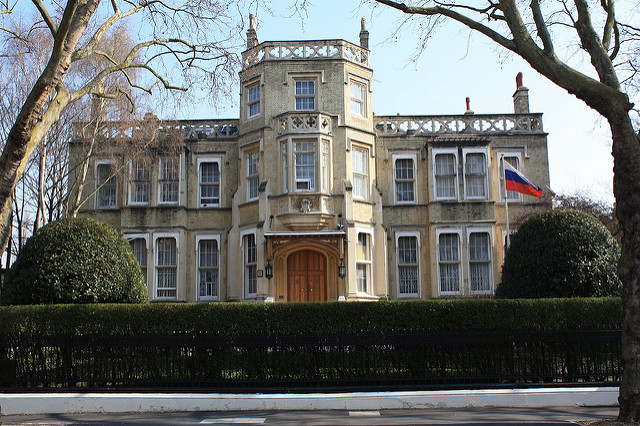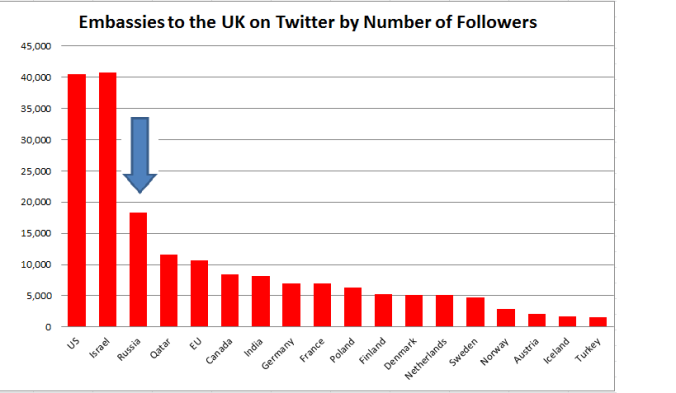 Over the past year, much has been written about Russian digital
diplomacy. While some have argued that Russia uses social media for
propaganda, analysis has shown that the Russian MFA is one of the most
active and dominant foreign ministries on twitter. Moreover, the Russian
MFA is one of the most central ministries among the online diplomatic
milieu.
Over the past year, much has been written about Russian digital
diplomacy. While some have argued that Russia uses social media for
propaganda, analysis has shown that the Russian MFA is one of the most
active and dominant foreign ministries on twitter. Moreover, the Russian
MFA is one of the most central ministries among the online diplomatic
milieu.
Last week, I had the opportunity to interview the press attaché at
the Russian embassy in London and learn first-hand about its social
media activities. I was also able to learn more about the Russian
digital diplomacy model including its work alongside embassies, training
of diplomats and evaluation of digital diplomacy activity.
Russian Embassy in London
Question: Who are you trying to reach through social media? Other embassies? The national press? The local population?
We believe that social media is now as important as traditional
media. We can reach as many people through twitter as we can with a
letter to the Financial Times. So we are definitely targeting and
reaching out to the general public. Our Russian language twitter channel
is aimed at Russian speaking audiences, whether it is the diaspora in
the UK or Russians back home. Our English language twitter channels are
targeted at various audiences including the press and the general
public.
Question: Do you know who your audience base on twitter actually is? Do you analyse your audience?
Yes. The embassy’s English twitter account has 295 verified followers
while the Ambassador’s account has 300 verified followers. Among these
are members of Parliament, members of the European Parliament,
representatives from local authorities, members of the press such as BBC
journalists and the London papers. We also attract correspondents to
Moscow and representatives from other countries. We follow other
embassies on twitter and they also follow us in return.
Interestingly, 39% of our English twitter followers live in UK, 15%
live in the US and 4% in Russia. So our social media presence is really
centred on the UK. Our followers’ interests are business, news and
politics. So we know the interests of our followers and we tailor
content to these interests. Also, these demographics suggest that we are
able to attract the audience base we define as important to our work.
Question: You stated that you follow other embassies
to London and that they follow you. Would you say that twitter is now a
tool for gathering information on the foreign policies of other
countries?
Yes, it is a new tool to learn more about the opinions of other
countries. But it is also a tool to perfect your social media skills. We
see what other embassies do online and sometimes we will follow suit.
Other times, embassies will see our tactics on social media and they
will adopt these tactics. There is a Diplomatic Press Attaches
Association in London which meets regularly to discuss social media
diplomacy.
Question: Perhaps the greatest difference between TV
mediated diplomacy and twitter mediated diplomacy is direct contact
with audiences. Do you think it’s important to respond to what your
followers write on social media?
Yes. It is very important and we often do it. In most cases we also
try to respond to criticism. Our duty is to clarify Russia’s position on
various issues. Many times people will criticise Russia not because of
our policies but because they don’t know what our policy is. So we are
able to use social media to clarify our position and have the audience
judge our policies in a more informed manner.

Russia’s embassy to the UK attracts some 18,000 followers on Twitter
Question: How do you evaluate social media activity? What parameters do you use?
We believe that the most important parameter is the general reach of
the content. So number of overall followers is very important.
Question: What other platforms is the embassy active on?
We currently have 3 accounts on twitter (two in English and one in
Russian), a Facebook account and accounts on YouTube, Flickr, SlideShare
and Storify. The latter are subsidiary tools as twitter is the main
platform we use.
However, we have recently begun using Periscope which has proven very
popular. We have 200 people watching our content simultaneously and we
stream exhibitions, speeches at receptions and other events we host at
the embassy. We find that Periscope attracts more followers than YouTube
so it is becoming an important platform for us.
Question: Do you post the same content on Facebook as you do on twitter?
We have a different demographic on Facebook so we share different
content. On Facebook, 46% of our “Friends” are in the UK, half of them
in London. Their main interests are culture so we write more about
cultural events and news relating to Russian culture. This year, for
instance, is the Russia-UK Year of language and literature so we will be
posting a lot of content on upcoming cultural events.
Question: Different MFAs seem to employ different
models for working alongside their embassies. How does your embassy work
with the MFA in Moscow? Do you send them reports on comments you
receive on social media? Do you send them regular analyses of your
social media presence?
Monitoring comments on social media is important as it helps us to
understand public opinion. For instance, as the Russian air campaign in
Syria began we had a storm of comments and letters in support of
Russia’s actions. These were comments from regular British people. So of
course we told the MFA about it. Such reporting is an integral part of a
diplomatic mission’s duties.
Nowadays, all Russian embassies are expected to be active on social
media networks that are popular in their host country. For instance, the
Russian embassy to China is active on Weibo and not twitter. There is a
unit inside the MFA’s Department of Information and Press that works
alongside embassies on social media issues.
Question: Given that press attaché’s are now in
charge of social media, has the role of the press attaché changed
significantly over the last 10 years?
It has changed a lot. Social media requires a special style of
writing and communicating. It’s very different from traditional media.
It also changes from one country to another. So it’s important to learn
how social media works and to be active on it. It is an additional work
load for the press attaché.
Question: Did you receive special training? Does the MFA train diplomats in social media?
My generation did not get such training. The assumption was (and is)
that every diplomat is a “universal soldier” so he or she should be able
to explain polices and interact with different audiences on different
platforms and perform consular, economic or other duties. However, today
the Russian MFA Diplomatic Academy offers special courses for press
secretaries that include social media.
Question: What do you think is the most novel aspect of your embassy’s digital diplomacy model?
Most likely the diplomatic club.
The diplomatic club is an app, the users of which allow us to publish
tweets through their accounts once a week. So our content is
automatically shared by them. It dramatically increases our online reach
and facilitates discussion. So really it’s a force multiplier. Once a
year we also invite all members of the diplomatic club to an event at
the embassy. We also send them a newsletter and arrange prize draws so
as to create a cloes virtual community.
Question: Over the past year, many people have
claimed that while some countries use social media for digital
diplomacy, Russia uses it for propaganda. Do you agree?
If you define propaganda as lying, then I disagree. We never publish
content online before it is verified, by us or the MFA. We only use our
accounts to publish relevant and accurate information. People can
obviously have different interpretations of facts. Russia has a position
on Syria, and the UK has another position and Saudi Arabia has another
position.
Question: Finally, do you think digital diplomacy is new tool for achieving traditional diplomatic goals or a new form of diplomacy?
In 1841, when Lord Palmerston received his first overseas cable, he
said that diplomacy was dead. We now know that diplomacy did not die.
Rather, diplomacy adopted new tools to be more efficient and diplomats
used new tools to better perform their duties.
However, with mass communication the duties of diplomats and embassies changed. Since the late 19th
century international summits became a regular occurrence and world
leaders directly talked to one another. Today, they talk to one another
all the time. So the role of diplomats has changed and today we see the
rise of public diplomacy. In an age when leaders talk to one another
constantly, an embassy can allocate more resources to public diplomacy.
Yet this too is not completely new. In 1791 there was a serious
proposal in the British parliament to go to war with Russia following
its victory against the Turkish Empire. The Russian ambassador, and the
Russian priest, to London began a campaign against such a war that
included publishing newspaper articles and the printing and distributing
of pamphlets. They also attended meetings at local councils in order to
gauge public opinion and influence people’s support of the war. So this
was a successful public diplomacy campaign conducted in the 18th century long before twitter.
So today diplomacy has new tools but its essence is not different.
Summary
The Russian embassy’s online presence seems to be targeted at three
core audiences: the press, the diplomatic community in London and the
British public. The embassy’s unique digital diplomacy model enables it
to extend its online reach through tweeting from followers’ accounts.
This may enable the embassy to be more effective online as its messages
emanate from regular users rather than government accounts that may be
seen as Twipoganda.
Moreover, the embassy seems to closely monitor its audience base and
tailor social media content to followers’ interests. Likewise, each
social media platform is used to promote different content, another form
of tailoring. Finally, the embassy seems to regard social media as an
integral part of the practice of diplomacy in the 21st century.